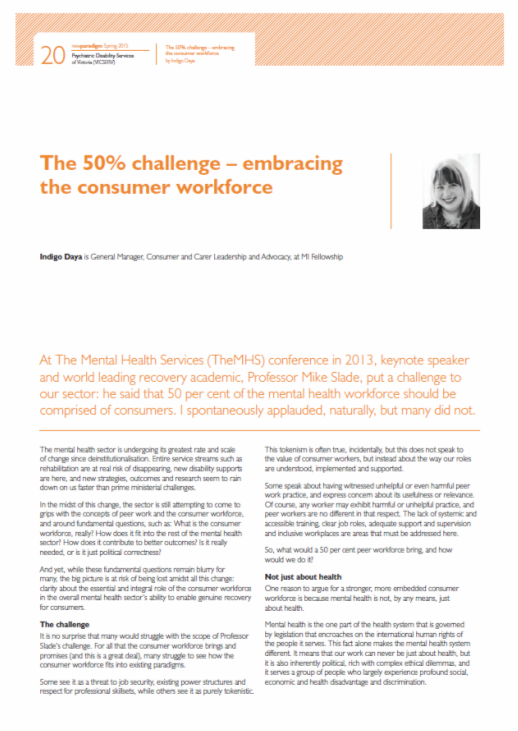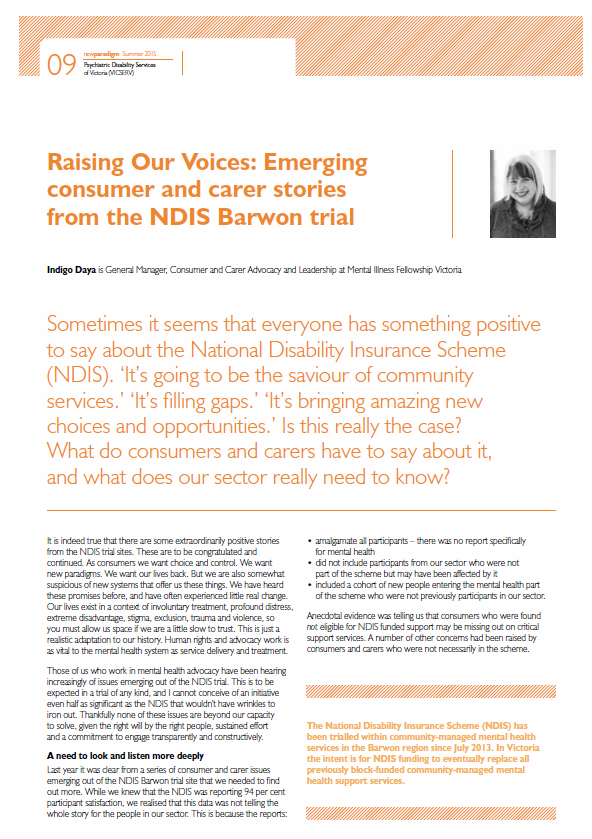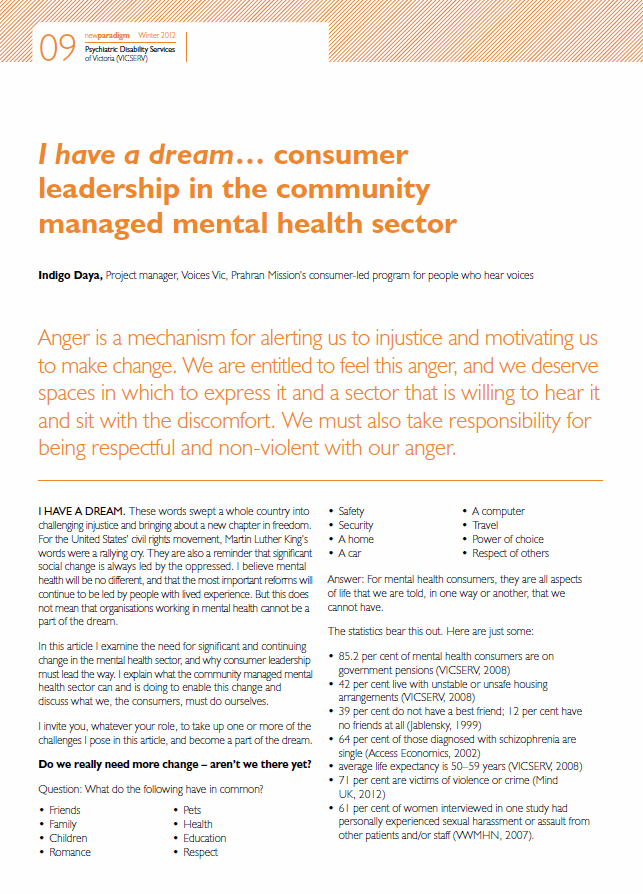
This page includes my published writing.
If any links don’t work, or are blocked by ‘paywalls’, please message me on social media with your email address and I will get you a copy.
I am the person of whom you speak

Link to online paper
Link to post that includes the poem from this paper
As consumers/survivors increasingly take up roles of influence within mental health service delivery and policy development, tensions sometimes arise about the validity and relevance of consumer perspectives. The author proposes that these tensions may be indicative of failure by the mental health system and the broader community to communicate, understand and believe in personal recovery. This first-person account reflects, in both poetry and prose, about the personal impacts of having the validity and relevance of one’s own experience denied, along with a personal account of the experience of madness and trauma, pessimistic prognosis, involuntary treatment, hope and personal recovery.
Reference: Daya, I. (2015). I am the person of whom you speak. Psychosis, 7:4, 359-365.
The 50% Challenge: Embracing the Consumer Workforce
Reference: Daya, I. (2015). The fifty percent challenge – Embracing the consumer workforce. New Paradigm: The Australian Journal on Psychosocial Rehabilitation, Spring, 20-27.
Link to past editions of New Paradigm
This article invites us to consider Professor Mike Slade’s challenge to increase consumers to fifty percent of our total mental health workforce. The article includes:
- Definitions of the consumer workforce
- Considering a human rights perspective as well as a health services perspective
- How the consumer workforce makes a difference: research findings
- Key factors for organisations to consider as they employ consumer workers
Raising Our Voices: Emerging consumer and carer stories from the NDIS Barwon trial.
Reference: Daya, I. (2015). Raising Our Voices: Emerging consumer
and carer stories from the NDIS Barwon trial. New Paradigm: The
Australian Journal on Psychosocial Rehabilitation, Summer, 9-13.
Link to past editions of New Paradigm
Australia is trialling a new disability support scheme (the NDIS) which will include mental health support services. While the scheme offers some important improvements for people diagnosed with mental illness, it also presents some serious challenges to recovery and genuine choice. This article followed an advocacy event that I organized in our trial site, as part of my role at MI Fellowship, for people to talk about how they were experiencing the scheme.
Inpatient Handbook
Daya, I. (2013). Alfred Psychiatry Inpatient Handbook. Alfred Health: Melbourne.
Link to online handbook
Note: The book has been edited by others since I wrote it.
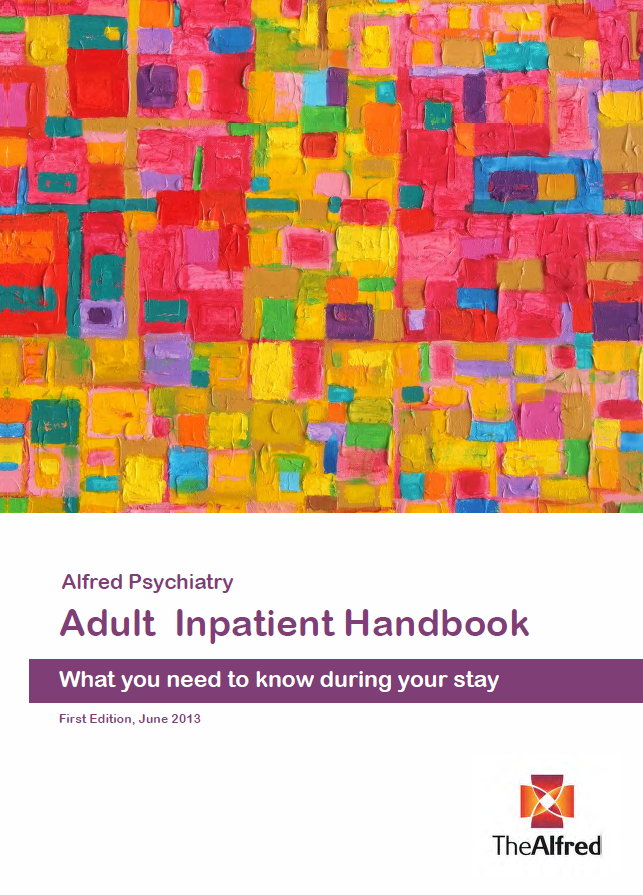
This was a lovely project. It began with me being asked to write a brochure for patients of the Alfred Hospital’s acute psychiatry inpatient unit. Following a period of speaking with patients, their families, and staff, it became apparent that a brochure wasn’t going to do the job – there was so much that people wanted to know! People wanted practical information, advice on managing mental health and working towards recovery, facts about medications and diagnoses, and spaces to keep track of their rights and plans. What evolved was an interactive handbook that is now issued to every patient.
The MadQuarry Dictionary
Reference: (ed) Daya, I (2013). The MadQuarry Dictionary: A consumer’s guide to the language of mental health. Our Consumer Place: Melbourne
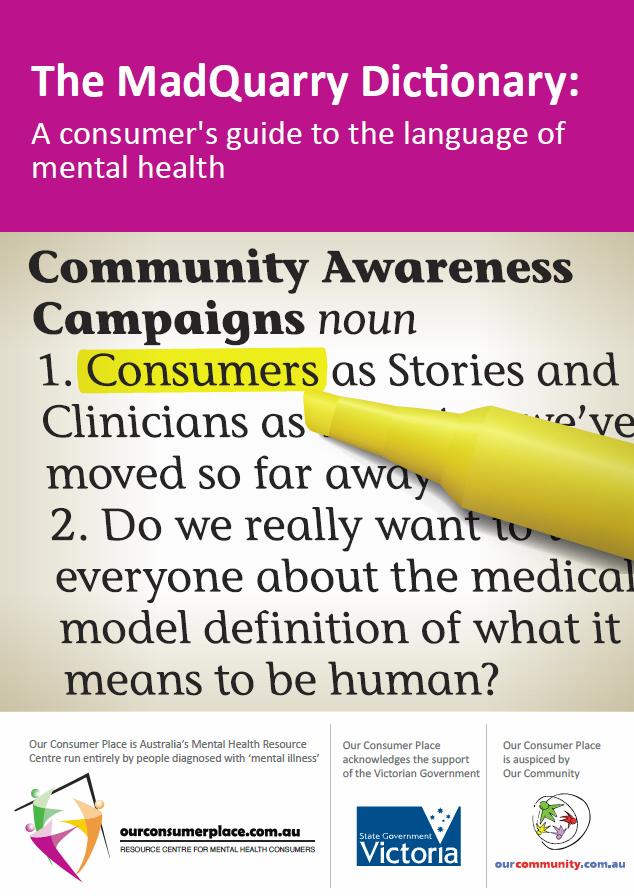
It was a joy to edit this online book that provides a humorous, political, and at times, heartbreaking, way of thinking about the language we use within mental health.
This project was led by the inimitable Merinda Epstein from Our Consumer Place, and includes hundreds of contributions by consumers/survivors.
I have a dream: Enabling consumer leadership in the community managed mental health sector.
Reference: Daya, I. (2012). I Have a Dream: Enabling consumer leadership in the community managed mental health sector. New Paradigm: The Australian Journal on Psychosocial Rehabilitation, Spring, 9-14.
Link to past editions of New Paradigm
I have a dream. These words swept a whole country into challenging injustice and bringing about a new chapter in freedom. For the United States’ civil rights movement, Martin Luther King’s words were a rallying cry.
They are also a reminder that significant social change is always led by the oppressed. I believe mental health will be no different, and that the most important reforms will continue to be led by people with lived experience. But this does not mean that organisations working in mental health cannot be a part of the dream.
In this article I examine the need for significant and continuing change in the mental health sector, and why consumer leadership must lead the way. I explain what the community managed mental health sector can and is doing to enable this change and discuss what we, the consumers, must do ourselves.
Smoking Mad: Enforced smoking bans in psychiatric hospitals are a human rights issue.
Reference: Daya, I. (2011). Smoking Mad: Enforced smoking bans in psychiatric hospitals are a human rights issue. Our Consumer Place Newsletter, June-July, 12-16.
Australia has followed other countries in banning smoking in all psychiatric hospital settings. Of course, most people think this is a very sensible idea – after all, these are health services. What many people may not realise is that most people who are patients in psychiatric hospitals are there against their will, unable to leave, and in the midst of the most extreme distress you could imagine. These bans force people to ‘quit’ against their will, increase distress levels, put people at risk by presenting a barrier to asking for help, and have created a culture of smuggling, illicit trade and, in some cases, extreme risk to patients. I fully appreciate that my position on this topic is politically incorrect, and also that this fight is pretty much lost. Nevertheless, I maintain that there is an important difference between health promotion and health enforcement. I also maintain that people in psychiatric wards are in a unique situation that deserves special consideration. On this topic, in our enthusiasm to promote health, we have let go of common sense and compassion.
Other published papers:
Daya, I. (2009). Building New Partnerships for Recovery. New Paradigm: The Australian Journal on Psychosocial Rehabilitation, Spring, 20-23.
Daya, I. (2009). Role Reversals, Responsibility And Recovery. In Robertson, S., Issakidis, C., Kellehear, K., Miller, V., Wright, B., Peters, J., Goding, M., Farhall, J. (Eds.). You, Your Family, Your Community, Your Mental Health – the path ahead, Contemporary TheMHS in Mental Health Services, Perth Conference Proceedings. Perth, 62-64.
Want to read more?
Check out more blog articles and recovery resources or subscribe to my emails.

